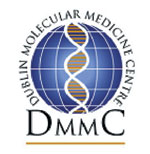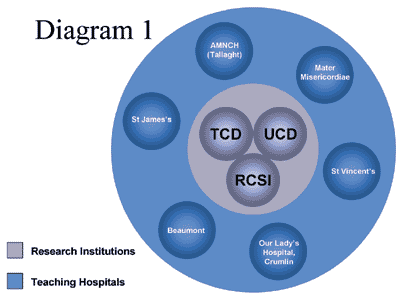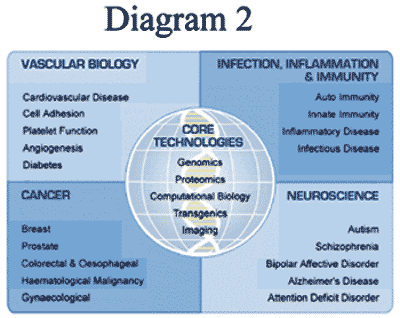| 2003 |

|
YEAR BOOK |
Trinity College Dublin, University College Dublin & Royal College of Surgeons in Ireland
|
Dublin Molecular Medicine Centre
|

Accelerating translational bioscience
The Dublin Molecular Medicine Centre is a research partnership between the Institute of Molecular Medicine (Trinity College Dublin) and the Centre for Molecular Medicine at the Conway Institute of Biomolecular and Biomedical Research (University College Dublin). The activities of DMMC are integrated with complementary research at the Royal College of Surgeons in Ireland through the Programme for Human Genomics.
This unique trans-institutional partnership focuses on improving our understanding of the aetiology and pathogenesis of commonly acquired human diseases by exploiting developments in genomics and proteomic technologies. Traditionally medicine has approached healthcare from the perspective of the external phenotype of the disease. Highly sophisticated imaging regimes have been developed that characterise disorders and identify appropriate therapy based on the symptoms exhibited. The genomics revolution allows scientists to better study the molecular mechanisms that contribute to dysfunction at a cellular level. In theory, this knowledge allows us to identify those groups of individuals who are most susceptible to particular diseases, examine the interplay between genetic and environmental factors, detect disease onset at an earlier stage, and develop sophisticated therapeutic responses. The DMMC accelerates the translation of fundamental molecular research to clinical applications resulting in improved patient healthcare.


Highlights from the DMMC
-
�Modern state-of-the-art research laboratories have been created at the Trinity Research Centres in St James's Hospital and at the Conway Institute of Biomolecular and Biomedical Research in UCD.
-
�Multi-discipline teams are conducting research focused in the areas of Cancer, Neuroscience, Vascular Biology, Inflammation, Immunity & Infection at a trans-institutional level.
-
�Clusters of scientists around specific research themes have been identified that will leverage major national and international funding (e.g. HEA, SFI, HRB, Wellcome Trust, EU framework 6). Clusters established to date focus on molecular research into cancer (specifically haematological malignancies, prostate and oesophageal cancer), the application of advanced computational tools to solving complex biotechnology problems, and immunomodulation and evasion mechanisms associated with infection and inflammatory disease.
-
�The establishment of the Prostate Cancer Research Initiative (a research consortium funded by the Irish Cancer Society) to develop new diagnostics, prognostic and therapeutic agents in prostate cancer.
-
�The recruitment of a directorate team under the leadership of Dr Pierre Meulien (former Senior Vice President for Research and Development at Aventis Pasteur Canada).
-
�Senior academics have been attracted to Dublin through the appointments of the Chair of Genetic Epidemiology (jointly filled by Dr Helen Colhoun and Dr Paul McKeigue), Chair of Bioinformatics (Dr Desmond Higgins) and the Chair of Proteomics (Dr Stephen Pennington). Two additional positions (Chair of Bioethics, Chair of Biomedical Genomics) are currently under appointment.
-
�Projects leading to the construction of dedicated genome resource units at the Mater and St Vincent's Hospitals have been initiated.
-
�Cross-institutional post-graduate education and training programmes in Molecular Medicine that combine the research and teaching strengths of RCSI, TCD and UCD to build short courses in areas of excellence and provide students with broad experience of state-of-the-art technologies and their applications.
-
�Future courses, informed by bio-industry requirements, will include an emphasis on research management and entrepreneurship. Students will be able to tailor their curricula to include specific research/disease areas, technologies and business skills most relevant to their needs. Many of these courses will be made available to postdoctoral workers, technical staff, academic staff and clinicians, in addition to postgraduate students, to enable career-long training.
-
�A common intellectual property agreement has been implemented that facilitates partnership between the DMMC and leading pharmaceutical, diagnostics and technology companies.
-
�DMMC is developing strategic alliances with major centres of excellence in Europe and North America that have complementary research interests.
The DMMC was established through funding from the Higher Education Authority (HEA) under its Programme for Research in Third Level Institutions.
Contact: Dr Pierre Meulien, CEO, DMMC, Newman House, 85 St. Stephen's Green, Dublin 2; Tel: +353 1 716 5560; Web: www.dmmc.ie